Higher Education
Perspectives / Poll / Recommended Resources
Today, a university degree carries a large wage premium. In Singapore, the median salary of a university graduate is 62 percent higher than those with diploma or A-level qualifications. Those with a degree in hand earn a substantial median salary of $4,200 while those with polytechnic diplomas or A-level qualifications earn $2,600.
Many individuals who obtain a degree acquire both economic and social benefits. Technological advancements, digitalisation, and related developments in the economy and labour markets have increased the demand for high-skilled workers and professionals. Higher education plays a key role in a country’s human capital and societal development. Academic qualifications are valued because they are perceived to signal the skills and contributions required by labour markets and broader society.
However, having higher education qualifications is not a guarantee of success or careers in desired fields. There are signs of skill mismatch in the job market with instances of graduates being over-educated and over-skilled for the jobs they eventually take on. Some employers have started to distrust university qualifications due to changing skill demand accelerated by automation, digitisation, and artificial intelligence while the information and communication technology sector has developed its own alternative credentialing system. It also seems that thriving in the new economy or finding success may not be entirely dependent on a university qualifications with more jobs opening up to those without a bachelor’s degree.
So, is a degree still needed to succeed today?
| YES, A DEGREE IS STILL NEEDED FOR SUCCESS. |
NO, A DEGREE IS NOT A MUST FOR SUCCESS. |
|---|---|
| Degrees still matter to most employers. Most employers still believe that a degree is a must-have for their employees despite the fact that many have the skills to do the job via other credentials. Employers have confidence in higher education and believe that graduates from reputable universities are already equipped with job-ready skills. Degree requirements serve as a filter for reducing the pool of eligible applicants. A majority of employers still use degrees to screen job applicants. Job recruiters also view degree completion as an indicator of a candidate’s potential. |
No degree? No problem, more employers think a degree is not necessary to do a good job. Increasingly, employers are ending degree requirements for many job openings to reach more diverse talent. On-the-job training as well as a candidate’s skills and relevant experience are deemed a better gauge of success for specific roles. More opportunities are now accessible to people without degrees, particularly in tech. Many companies such as IBM and Accenture as well as the U.S. government are shifting to skills-based hiring. |
| Universities are preparing students for the modern economy with broad-based curriculum and new initiatives. Universities are evolving to stay relevant, in response to the Fourth Industrial Revolution and the increasingly VUCA (volatile, uncertain, complex and ambiguous) world. Multifaceted real-world and workplace issues often benefit from multidisciplinary and interdisciplinary learning offered by broad-based university curriculum. Singapore universities, for example, have introduced a slew of initiatives, including interdisciplinary learning, involvement of industry partners in internships and curriculum structure, and the promotion of lifelong learning. |
Skills, not degrees, will shape the future of work. The changing nature of work and careers quickened after the COVID-19 pandemic, accelerated by automation and artificial intelligence (AI). The jobs of tomorrow at the forefront of the data and AI economy will require talent with relevant skills – which can be learnt by those without degrees. The future of work will be about job skills; not about degrees. The right skills will be valued more than academic qualifications alone. In Singapore, polytechnics and ITEs offer opportunities for industry specialization and exposure, equipping graduates with in-depth skills, training and knowledge for specific industries and economies. |
| A degree has its benefits. Holding a degree increases the prospect of employment as well as higher income. Workers who have higher levels of education typically earn more and have lower rates of unemployment compared to those who have less education. Building a social network is essential to success. Studying in universities provides networking opportunities, from interning to volunteering. Degree graduates can expect a level of support from their professors, mentors, and alumni network. For instance, entrepreneurs are also more likely to receive 19% more funding in early-stage fundraising for start-ups if they share an alma mater with investors. |
A degree is not the only path to success. The absence of a degree is no longer a barrier to good jobs. A multitude of successful careers are not dependent on a university degree, instead, owing success to pursuing passions, adaptability and seeking opportunities. These careers include those in the cybersecurity and new media industries as well as entrepreneurial ventures. Networking sessions by various organisations, career fairs or online platforms have opened up opportunities for mentorship, support and honing soft skills. Alumni networks from non-degree educational institutions also offer support. For example, Ngee Ann Polytechnic’s alumni-led “Angel Network” aims build an extensive network of successful founders among its graduates and nurture students’ entrepreneurial talent. |
Workers need a holistic skill set composed of cognitive skills, socio-emotional skills, technical skills, and digital skills to thrive in the modern economy. Given the accelerating pace of change, skills development and lifelong learning will be required to ensure the continual renewal of skills over one’s working life.
Let’s hear our guest speakers weigh in on this issue:
Poll: Your views matter!
If you are unable to view the embedded form below, please click here.
Recommended Resources
Explore the resources below to find out more about Education, and whether degrees are still needed to succeed today.
Videos
CNBC Make It. (2021, June 25). Why You Need a College Degree to be Happy. Retrieved 2023, January 11.
Harvard Business Review. (2022, November 17). LinkedIn CEO Ryan Roslansky: Skills, Not Degrees, Matter Most in Hiring. Retrieved 2023, January 11
Yahoo! Finance (2021, May 29). 50% of Recent College Grads Feel Underqualified to Enter the Workforce . Retrieved 2023, January 11
Cambridge University Press & Assessment. (2021, June 25). How to Build Lifelong Learning Skills for the 21st Century Workplace. Retrieved 2023, January 11.
Websites
The College Payoff: More Education Doesn’t Always Mean More Earnings
Carnevale, Anthony P., Ban Cheah, and Emma Wenzinger. (2021). The College Payoff: More Education Doesn’t Always Mean More Earnings. Georgetown University. Retrieved 2023, January 11.
The Emerging Degree Reset: How the Shift to Skills-Based Hiring Holds the Keys to Growing the U.S. Workforce at a Time of Talent Shortage
Fuller, Joseph B., Christina Langer, Julia Nitschke, Layla O’Kane, Matthew Sigelman, and Bledi Taska. (2022, February). The Emerging Degree Reset: How the Shift to Skills-Based Hiring Holds the Keys to Growing the U.S. Workforce at a Time of Talent Shortage. Burning Glass Institute. Retrieved 2023, January 11.
The Rise of Skills-Based Hiring and What it Means for Education
Ark, Tom Vander (2021, June 21). The Rise of Skills-Based Hiring and What it Means for Education. Forbes. Retrieved 2023, January 11.
Why Skills - Not Degrees - Will Shape the Future of Work
Kumar, S. Ravi, and Steve George (2020, September 21). Why Skills - Not Degrees - Will Shape the Future of Work. World Economic Forum. Retrieved 2023, January 11.
The Future of Jobs Report 2020
The Future of Jobs Report 2020.* (2020, October). World Economic Forum. Retrieved 2023, January 11.
Changing Demand for Skills in Digital Economies and Societies
Changing Demand for Skills in Digital Economies and Societies.* (2021, December 9). International Labour Organization. Retrieved 2023, January 11.
Podcasts
No Degree, No Problem for Growing Number of Employers
The Wall Street Journal. (2022, December 2). No Degree, No Problem for Growing Number of Employers. Retrieved 2023, January 11.
Google Expands College-Alternative Tech Skills Training
Harvard Business School. (2020, August 18). Google Expands College-Alternative Tech Skills Training. Retrieved 2023, January 11.
More Skipping College Today, What Will that Mean for Tomorrow?
The Wall Street Journal. (2022, August 22). More Skipping College Today, What Will that Mean for Tomorrow? Retrieved 2023, January 11.
Joe Fuller on Enrollment Growth University: How Can Colleges Address the Middle Skills Gap While Readying Students for the Job Market?
Harvard Business School. (2021, September 21). Joe Fuller on Enrollment Growth University. Retrieved 2023, January 11.
The Rise of Thinking Skills in Higher Education and the Workplace
Cambridge University Press & Assessment (2021, April 27). The Rise of Thinking Skills in Higher Education and the Workplace. Retrieved 2023, January 11.
“I Don’t Think the Country is Turning Away from College.”
Freakonomics (2022, May 4). “I Don’t Think the Country is Turning Away from College.” Retrieved 2023, January 11.
NLB eBooks
| Recommended Titles | |
|---|---|
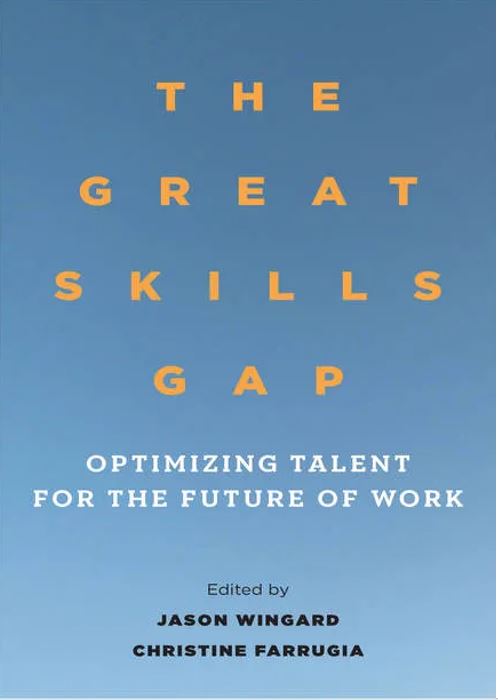 |
The Great Skills Gap: Optimizing Talent for the Future of Work Wingard, Jason, and Christine Farrugia. (2021). The Great Skills Gap: Optimizing Talent for the Future of Work. Stanford, California: Stanford University Press. Retrieved from OverDrive. (myLibrary ID is required to access the eBook). |
 |
In Defense of a Liberal Education. Zakaria, Fareed. (2015). In Defense of a Liberal Education. W.W. Norton & Company. Retrieved from OverDrive. (myLibrary ID is required to access the eBook). |
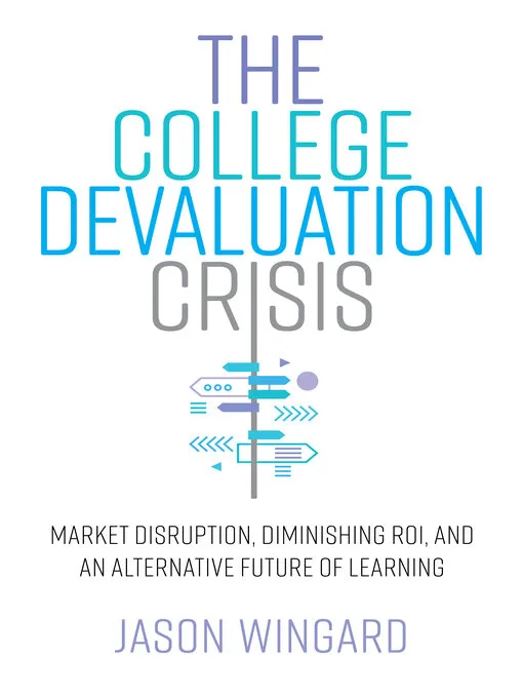 |
The College Devaluation Crisis: Market Disruption, Diminishing ROI, and an Alternative Future of Learning Wingard, Jason. (2022). The College Devaluation Crisis: Market Disruption, Diminishing ROI, and an Alternative Future of Learning. Stanford, California: Stanford University Press. Retrieved from OverDrive. (myLibrary ID is required to access the eBook). |
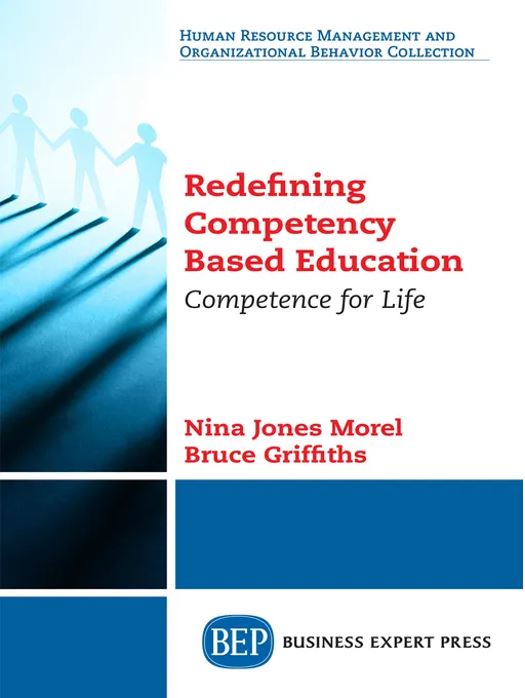 ! ! |
Redefining Competency Based Education: Competence for Life Morel, Nina Jones, and Bruce Griffiths. (2018). Redefining Competency Based Education: Competence for Life. New York: Business Expert Press. Retrieved from OverDrive. (myLibrary ID is required to access the eBook). |
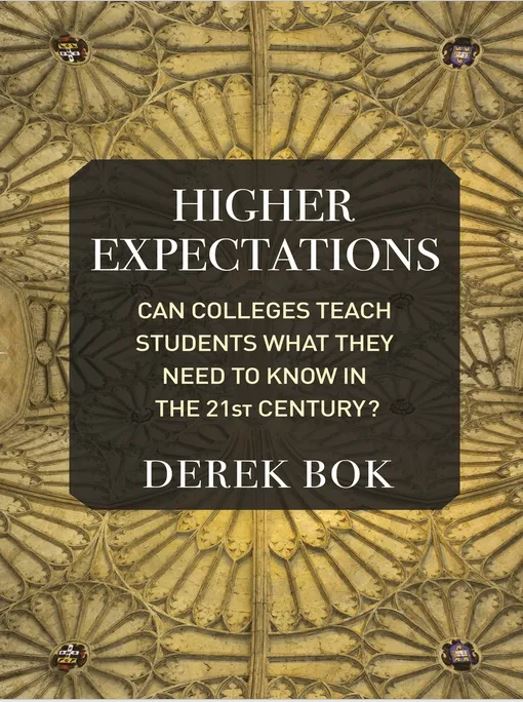 |
Higher Expectations: Can Colleges Teach Students What They Need To Know in the 21st Century? Bok, Derek. (2020). Higher Expectations: Can Colleges Teach Students What They Need To Know in the 21st Century? Princeton: Princeton University Press. Retrieved from OverDrive. (myLibrary ID is required to access the Audiobook). |
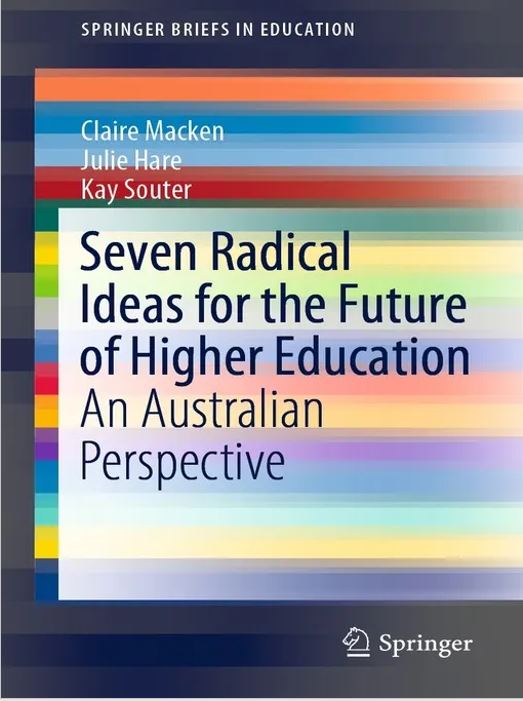 |
Seven Radical Ideas for the Future of Higher Education Macken, Claire and Julie Hare. (2021). Seven Radical Ideas for the Future of Higher Education. Singapore: Springer Nature Singapore. Retrieved from OverDrive. (myLibrary ID is required to access the eBook). |



